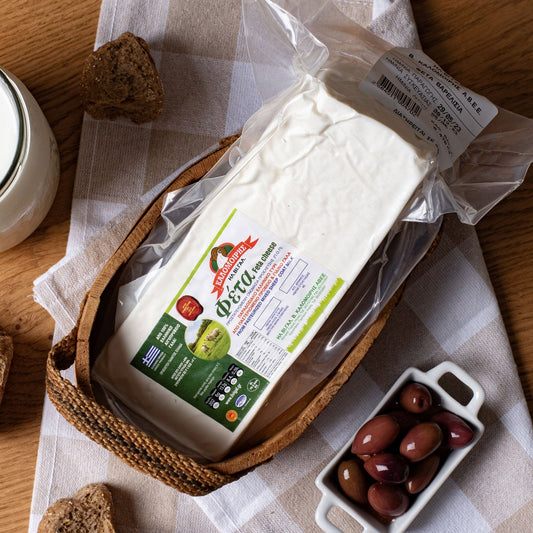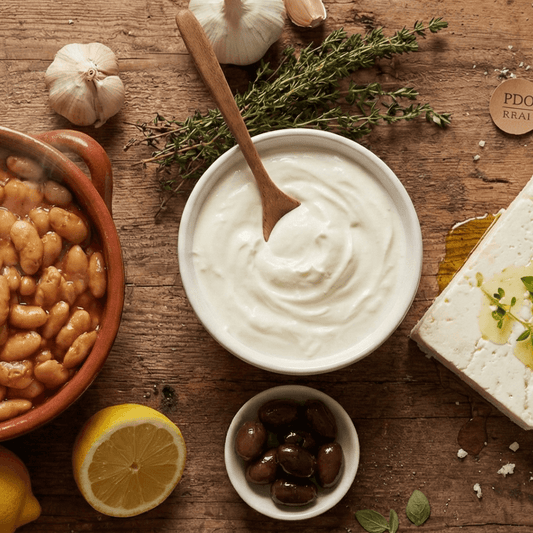
Scientific research leaves no doubt: the Mediterranean diet is a precious ally for our health. Extra virgin olive oil, legumes, fruits, vegetables, fish have beneficial properties that contribute to longevity and the defense of our body against many diseases.
The Mediterranean diet, also called the Cretan diet or Mediterranean diet, is a traditional healthy eating practice in many countries of the Mediterranean basin. Of course, there are some differences from one country to another in the Mediterranean, related to the production, the different customs and traditions of each country.
How did the term “Mediterranean diet” come about?
The Seven Countries Study began at the end of the 1940s in the United States, inspired and created by the famous Professor Ansel Keys, who was the first exponent of the "diet-heart" connection, but also that between cholesterol and coronary heart disease.
The survey of the seven countries gave the scientific community - not the scientific community - a famous term. That of the “Mediterranean diet”. The survey covered Greece, Italy, the Netherlands, Yugoslavia, Finland and Japan.
The result of the research was that the population of Crete was found to have the lowest mortality from coronary heart disease compared to all others. This is why it was originally called the “Cretan diet” or healthy diet.
In 1993, the International Conference on the Mediterranean Diet decided what it would consider a healthy and traditional Mediterranean diet and in 1995, the "Mediterranean Diet Pyramid" was created.
The “Mediterranean diet” was inscribed on November 16, 2010 on the representative list of the intangible cultural heritage of humanity by UNESCO at the request of Greece, Italy, Spain and Morocco. In 2013, three other countries joined the registration: Cyprus, Croatia and Portugal.
What is the structure of the Mediterranean diet pyramid?
The Mediterranean diet has a meal plan shaped in the form of a pyramid in order to determine for each type of food the required amount of consumption in monthly, weekly and daily frequencies.
The pyramid at its base includes foods that should be eaten daily and in significant amounts, while at the top are foods that should not be eaten often and in smaller amounts.

Starting from the base of the pyramid, it is necessary to consume:
Daily
- Cereals and their derivatives (eg bread, pasta, rice) are the basis of the Mediterranean diet, as they are rich in carbohydrates which are an important source of energy. It is best to choose complex carbohydrates, such as whole grains, and to eat at least 4 servings of grains and their derivatives per day.
- Fruits and vegetables are rich in vitamins B9, K, C and A and in general in nutrients necessary for health. They contain a large percentage of carbohydrates, antioxidants and are high in fiber.
- Legumes & nuts together form a food group. Legumes provide energy, are low in fat, high in fiber, and high in protein and iron. Nuts are generally high in monounsaturated fatty acids, just like olive oil, and many studies have shown that they lower cholesterol levels. They are rich in fiber and vitamins (eg vitamin E), but should be avoided in large amounts as they contain a lot of calories.
- Olive oil is rich in antioxidants and monounsaturated fats and is a key ingredient in the Mediterranean diet. Studies have shown that olive oil has a protective role against cancer and cardiovascular disease.
- Dairy products (mainly cheese and yoghurt) are rich in calcium, protein, potassium and phosphorus. Dairy products, especially milk and cheese, contribute substantially to the intake of calcium, selenium, zinc and vitamin B.
Weekly
- Fish contain high amounts of omega-3 healthy fats, which are believed to significantly reduce the risk of coronary heart disease. In addition, they contain high value proteins and various minerals.
- Poultry provide the body with proteins of high nutritional value and iron, which are easily assimilated by the body.
- Eggs are a food rich in proteins of high biological value, vitamins and minerals.
- Sweets generally contain sugar and for this reason, they should be eaten in moderation.
Monthly
- Red meat (beef, pork or lamb) should be eaten a few times a month because it contains saturated fat, which has adverse effects on health.
Why follow the Mediterranean diet?

The advantages of applying the standard of the Mediterranean diet are manifold. Specifically:
- Slow down aging and promote life expectancy because it prevents various heart diseases as well as certain forms of cancer.
- Reduce the incidence of coronary heart disease and stroke. Avoiding red meat and processed foods, and replacing alcohol with drinking red wine, helps protect our heart and associated illnesses.
- Reduce triglyceride, total and LDL (“bad”) cholesterol levels and maintain HDL (“good”) cholesterol levels in the blood. Fruits and vegetables have a strong cholesterol lowering effect by helping to eliminate cholesterol.
- Reduce the incidence of type 2 diabetes. The Mediterranean diet is rich in fiber, which reduces the rise in blood sugar, induces satiety and delays the digestive process.
- Reduce blood pressure levels. Eating fatty fish, such as sardines, which contain omega-3 fatty acids, reduces the risk of myocardial infarction.
- Reduce the incidence of Parkinson's and Alzheimer's diseases.
- Reduce the risk of depression. Consuming olive oil increases serotonin in the brain, which plays an important role in regulating mood.
How to change your eating habits?

- Replace all pasta and pastries with whole grain products to increase the amount of fiber you eat.
- Try to increase the fruits and vegetables you eat during the day.
- Plan in our weekly schedule to eat fish at least twice a week to obtain the necessary omega-3 fatty acids.
- Limit the weekly consumption of red meat and replace it with white meat or legumes such as beans and lentils.
- Consume nuts and legumes, as they induce a feeling of fullness and fill the body with valuable fiber.
- Replace butter with olive oil.
- Drink 6 to 8 glasses of water a day and exercise regularly.














